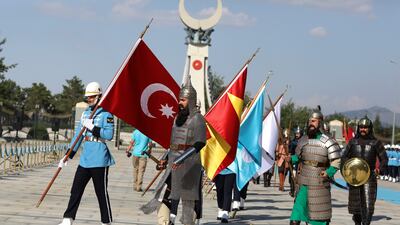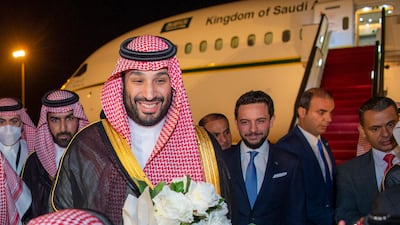With the final preparations under way for US President Joe Biden’s eagerly anticipated visit to Saudi Arabia next month, the kingdom finds itself at the centre of intense diplomatic activity.
While there are high hopes in the region that Mr Biden’s visit will help to reset relations with its longstanding ally, Saudi Arabia’s Crown Prince Mohammed bin Salman has launched his own initiative to revitalise relations in the region.
In the course of the past week, Prince Mohammed has visited Egypt, Jordan and Turkey in an effort to co-ordinate with key regional partners ahead of Mr Biden’s arrival.
During a meeting with Egyptian President Abdel Fattah El Sisi on Tuesday, Prime Mohammed, whose country provides important financial support to Cairo, had detailed discussions on what an official spokesman described as “regional and wider international political affairs”. Similar discussions took place with Jordan’s King Abdullah the following day, when the Crown Prince flew to Amman, before ending his week of shuttle diplomacy in Ankara, where he met Turkish President Recep Tayyip Erdogan.
In Egypt and Jordan, the talks primarily focused on what implications Mr Biden’s visit might have for the region, especially regarding the Iran issue. There were also discussions about the likely impact the Ukraine conflict could have on the region, especially the possibility of Egypt being affected by grain shortages. Prior to the conflict, Ukraine provided about one third of global grain requirements, the majority of which is exported to the Mena region. But supplies have been severely disrupted by the fighting, raising fears of starvation.
Another key focus was the forthcoming summit of the Gulf Co-operation Council, which Saudi Arabia will host on July 16 in Jeddah, and which will also be attended by the leaders of Egypt, Jordan, Iraq and the US.
Saudi talks in Cairo and Amman were also aimed at co-ordinating positions on key issues ahead of the joint summit with Mr Biden.
Of equal importance this week has been Prince Mohammed's visit to Turkey as part of the process to improve relations following the heightened tensions between the two over the past several years, reaching an all-time low after the killing of Saudi journalist Jamal Khashoggi in Istanbul in 2018.
Mr Erdogan took the first step in April when he visited Saudi Arabia. Prince Mohammed reciprocated by making his first official visit to Turkey since becoming Crown Prince in 2017. Prior to the talks, Mr Erdogan said his main objective was to raise Turkish-Saudi relations to a “much higher degree”.
Prince Mohammed’s visit comes at a time when Turkey is undergoing its worst economic crisis in two decades and, with elections looming next year, Mr Erdogan will be looking for financial support. Improvement in relations has already led to Riyadh lifting an informal boycott of Turkish goods that cut Ankara’s exports to the kingdom by 90 per cent. Earlier discussions have already led to the removal of restrictions on trade, air travel and the broadcast of popular Turkish TV shows in Saudi Arabia.
There are also suggestions that a potential currency swap deal might be arranged, as Ankara is suffering a shortage of foreign currency reserves that it desperately needs to prop up its ailing lira.
In return for improving economic ties with Ankara, Saudi Arabia is looking to conclude deals on energy and defence, with the latter said to be keen to purchase Turkey’s Bayraktar armed aerial drones that have recently proved effective in war zones in Ukraine, Syria, Libya and Nagorno-Karabakh.
Prince Mohammed’s diplomatic efforts come at a critical juncture for the region, with expectations riding high that Mr Biden’s visit next month will signal an important shift in White House policy.
To date, the primary focus of the Biden administration’s Middle East policy has been to concentrate its efforts on reviving the controversial nuclear deal with Iran, the Joint Comprehensive Plan of Action (JCPOA). By pursuing this policy, the White House has given the impression that it is less concerned about maintaining its longstanding relationship with Saudi Arabia, a close ally of the US since former president Franklin Roosevelt met then King Abdulaziz on an American warship in 1945.
Saudi concerns that the Biden administration was neglecting its interests heightened when, in one of his first acts as President, Mr Biden removed Yemen’s Iranian-backed Houthi rebels from Washington’s designated list of terrorist groups. The move was designed to send a goodwill gesture to Iran, as much as encouraging the Houthis to engage in peace talks over Yemen’s future. In the event, the American gesture appears to have made little impression on Tehran, while the Houthis responded by increasing their attacks against Saudi Arabia and the UAE.
Now, with little sign of progress being made on the Iran nuclear talks, there are mounting expectations that Mr Biden will improve ties with Saudi Arabia and other Gulf allies.
There is certainly a growing awareness in Washington that, despite all the political capital the White House has invested in reviving the JCPOA, the prospects of agreeing a deal with Tehran are looking increasingly remote, not least because Iran has continued working on its enrichment activities while the negotiations have been taking place.
Last month, the International Atomic Energy Agency, the UN’s nuclear watchdog responsible for monitoring Tehran’s nuclear activities, reported that Iran now has an estimated 43 kilograms of uranium enriched to 60 per cent purity, a sufficient quantity of fissile material to make at least one nuclear warhead if enriched up to 90 per cent. This is not the sort of activity expected of a country that is interested in a peaceful resolution of its nuclear activity.
Consequently, the Biden administration has belatedly realised the importance of having strong and reliable allies in the region such as Saudi Arabia.





















